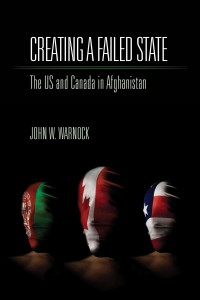Social Science and the Afghan War: Canadian Perspectives

Creating a Failed State
The U.S. and Canada in Afghanistan
It would be mistaken to ignore the geopolitical interests of the United States in the Middle East and Central Asia. Warnock describes how US foreign policy since the Cold War has been to maintain hegemony in the context of growing competition from Europe and Asia. The United States has articulated a new military strategy based on ‘preventative warfare,’ and has begun the process of encircling China and Russia with military bases. In the context of shifting power relations in the world economy, the energy resources of the Middle East and Caspian Sea basin have been imbued with new significance. The western strategy is to maintain leverage over hydrocarbon distribution networks in the Middle East and Central Asia, so as to limit or shape the development paths of China, Russia and other competitors. Warnock suggests that the decision to wage war in Afghanistan was likely made in the summer of 2001, when the ‘Six plus Two’ negotiations involving the US, Russia and the six neighbouring countries of Afghanistan failed to gain agreement from the Taliban for a power-sharing deal with the Northern Alliance and a new pipeline in the country (83). Whether or not this claim is true, Warnock makes a strong point on the geopolitical and economic conflicts at the heart of the war. In his view, the war is inextricably linked to the agenda of western imperialism: the effort to expand NATO into new territories, gaining control over key resources, and preventative action against China and Russia. The war, in other words, is a conflict over power and resources in Asia and the wider world system. …According to Warnock, the solution for Afghanistan is not an increase of foreign forces or a redoubled aid and humanitarian effort in support of the occupation. Instead, what is needed is a ‘broad peace settlement that includes the countries that neighbour Afghanistan’ (176). In other words, Canada must support a withdrawal of foreign troops in conjunction with an international peace agreement between Pakistan, Russia, Iran, India, the Central Asian states, and key stakeholders in Afghanistan, including the Taliban. Canada must support democratic and secular parties in Afghanistan, and reject ‘the neoliberal development plan imposed on [the country]’ (179). To achieve these goals, the Canadian left must reinvigorate the anti-war and global justice movements and build support for an ‘independent foreign and defence policy’ in Ottawa (185). While Canada ‘share[s] the responsibility for the tragic situation that exists today in Afghanistan,’ it can still effect positive change through peaceful development efforts (186, 183). Through such methods Canada can work against the logic of state failure. –Excerpt taken from “Social Science and the Afghan War: Canadian Perspectives” by Jerome Klassen, Socialist Studies: the Journal of the Society for Socialist Studies 5(2) Fall 2009: 123-132.

